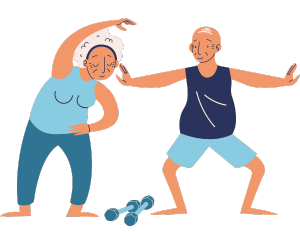Alzheimer’s disease is a progressive neurodegenerative disorder which poses a significant challenge to both individuals and their families. As we continue to delve deeper into understanding this complex condition, emerging research highlights the potential benefits of exercise in managing and possibly preventing Alzheimer’s disease. In this portion of the newsletter, we’ll explore the connection between Alzheimer’s and exercise, shedding light on how physical activity can contribute to cognitive health and overall well-being.
The Alzheimer’s Puzzle
Alzheimer’s disease, characterized by memory loss, cognitive decline, and behavioural changes, affects millions of people worldwide. While the exact causes of Alzheimer’s remain unknown, research indicates that a combination of genetic, lifestyle, and environmental factors contribute to its development. Among these factors, physical activity has garnered attention for its potential to mitigate the onset and progression of the disease.
The Exercise-Cognition Link
Engaging in regular physical activity has long been associated with numerous health benefits, including cardiovascular health, weight management, and stress reduction. However, recent studies have also revealed a compelling connection between exercise and cognitive function. Physical activity has been shown to stimulate the release of neurotrophic factors, such as brain-derived neurotrophic factor (BDNF), which promote the growth and maintenance of neurons. These effects are particularly relevant when it comes to Alzheimer’s disease.
Benefits of Exercise for Alzheimer’s Patients
- Slowing Cognitive Decline: Physical activity has been linked to a slower rate of cognitive decline in individuals with Alzheimer’s. Regular exercise can help preserve cognitive functions like memory, attention, and executive function, potentially improving the quality of life for those living with the disease.
- Reducing Neuroinflammation: Chronic inflammation in the brain is a hallmark of Alzheimer’s disease. Exercise has been shown to have anti-inflammatory effects, which can help reduce neuroinflammation and potentially slow down the progression of the disease.
- Enhancing Blood Flow: Cardiovascular health and brain health are closely intertwined. Exercise promotes better blood flow and oxygen delivery to the brain, nourishing brain cells and supporting cognitive function.
- Managing Behavioral Symptoms: Alzheimer’s patients often experience behavioural symptoms like anxiety, depression, and agitation. Exercise has been shown to have a positive impact on mood regulation, potentially alleviating these symptoms and improving overall well-being.
Prevention Through Lifestyle
In addition to its potential benefits for those already diagnosed with Alzheimer’s, exercise may also play a crucial role in prevention. Adopting a healthy lifestyle that includes regular physical activity, a balanced diet, sufficient sleep, and social engagement can collectively contribute to reducing the risk of developing Alzheimer’s disease. Before embarking on an exercise routine, it’s important to consult a healthcare professional, especially if you or a loved one have been diagnosed with Alzheimer’s disease. Tailoring exercise plans to individual needs and abilities is essential to ensure safety and effectiveness.
Conclusion
As we continue to search for ways to combat Alzheimer’s disease, exercise emerges as a promising avenue for improving cognitive health and overall well-being. While it may not be a definitive cure, the evidence supporting the positive impact of exercise on cognitive function and symptom management is compelling. By incorporating regular physical activity into our lives, we can take proactive steps to empower our minds and bodies, potentially enhancing our resilience against the challenges posed by Alzheimer’s disease.
Alexandra Struck,
Clinical Exercise Physiologist

